- Messages
- 429
- Location
- Idaho, USA
Here are the species that I currently have for sale, please read all of the Terms & Conditions before ordering! Minimum $25 order!
Roaches:
Aglaopteryx gemma "Key Largo, FL" (Little Gem Roach)
This small but beautiful Ectobiid hails from the southeastern US, and has eluded culture for quite some time. Thankfully they've actually proven rather easy to breed, and enjoy humid and warm conditions, with good airflow. All life stages climb well, but thankfully adults of neither sex can fly. *FL Legal*
(Caresheet)
10 Mixed nymphs: $20
20 Mixed nymphs: $30
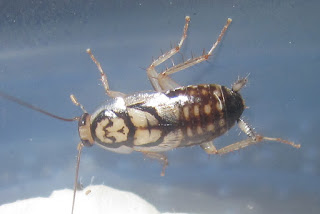
Arenivaga bolliana "Del Rio, TX" (Dark Form) (Boll's Dark Sand Roach)
A rare color form of an already rarely cultured species, adult males of this form sport dark grey/black wings with slight tan speckling, and females are black with reddish abdomens. One of the easier to culture Arenivaga IMO.
(Caresheet)
10 Mixed nymphs: $25
Arenivaga tonkawa "San Antonio, TX" (Tonkawa Sand Roach)
A nice little native sand roach, one of the easiest to culture. They seem to prefer higher humidity than some other Arenivaga spp., but similar to the rest of the genus, need very high ventilation levels.
(Caresheet)
8 Small nymphs: $20
Balta vilis (Plain Yellow Roach)
A small delicate species that is a plain but attractive yellow color. Fairly easy to set up and prolific if kept right, a must have for Ectobiid enthusiasts. First US offering in years!
(Caresheet)
10 Mixed: $25
25 Mixed: $30
50 Mixed: $45
Compsodes schwarzi (Schwarz's Hooded Roach)
Second smallest roach in the hobby, prolific and a great micro-feeder! *FL Legal*
(Caresheet)
25 Mixed: $20
50 Mixed: $35
100 Mixed: $60
200 Mixed: $100
Dipteretrum hanstroemi (Hanström's Little Runners)
A very underrated African Ectobiid that breeds rather prolifically in warm, dry, well ventilated conditions. They can be prone to bent/shortened antennae issues if humidity is too high. They have some feeder potential, though all life stages climb well.
(Caresheet)
10 Small nymphs: $20
Epilamprinae sp. "Kota Kinabalu, Malaysia" (Borneo Leaf Mimic)
An unidentified (and likely undescribed) species from Malaysia, one of the hardiest and easiest to breed Epilamprids in the hobby. Beautiful, with females usually being an olive brown color, males often a brighter orange.
10 Mixed nymphs: $25
20 Mixed nymphs: $35
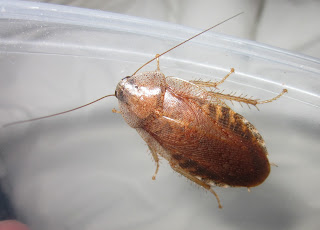
10 Mixed nymphs: $30
20 Mixed nymphs: $50
30 Mixed nymphs: $65
Gromphadorhina sp. "Unidentified" (Sidestripe Hissing ****roach) *Pure*
Most likely a pure, distinct locality/subspecies of G.portentosa. An impressive strain both in coloration and size, sadly the locality is unknown. Very uncommon in the hobby, rarely available!
8 Mixed: $70
5 Small/Medium adult males: $30
Gyna capucina (Pink Roach)
One of the holy grails of US Blatticulture, the Pink roach! These beauties are a bit more demanding than other Gyna spp., and need decent space and a steady source of high heat for consistent breeding.
(Caresheet)
10 Small nymphs: $70
Margattea nimbata (Raindrop Roach)
A neat, small Ectobiid brand spanking new to US culture. Easy to breed and tolerant of a wide variety of conditions.
(Caresheet)
10 Mixed: $20
20 Mixed: $30
Neostylopyga rhombifolia "Chinese Hobby Stock" (Harlequin Roach)
A very pretty species that seems to regularly crash and boom in the US hobby. Many strains are finicky and have issues with ooths failing to hatch, random nymph die offs, etc., this strain doesn't appear to have that issue though. Males of this stock have pretty red coloration on their abdomens, females are more black.
10 Small nymphs: $65 (Ask for Availability)
Panesthia angustipennis cognata "Cambodia" (Orangeback Roach)
New and very rarely available in the US hobby, this is a slow growing and breeding species that needs a substrate of rotten wood. Medium/Large nymphs are beautifully patterned, and the chunky little adults are adorable as well!
8 Small nymphs: $70
Parcoblatta americana "Table Rock, Boise - ID" (American Wood Roach)
US native, can take a while to get cultures established, but makes for a good occasional feeder that breeds at room temps, and won't infest your house!
(Caresheet)
10 Mixed nymphs: $20
20 Mixed nymphs: $30
Perisphaerus punctatus "Macao" (Punctate Roly-poly Roach)
A brand new species to culture, first US offering! This species is very similar to P.pygmaeus, but is larger, glossier, more arboreal, hardier, and can handle slightly drier setups as well (though high air humidity is important). At last, an alternative to P.pygmaeus in the hobby!
8 Small nymphs: $130
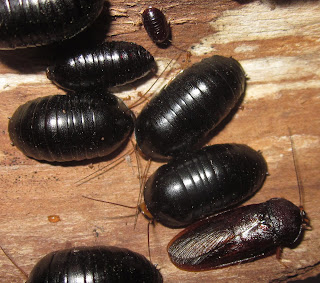
A small beetle mimic, this species is very difficult to find in the wild, and even more rare in culture. They are fairly finicky, and prefer high humidity, decent ventilation and multiple feeding areas. *FL Legal*
(Caresheet)
8 Mixed nymphs: $30
Princisia vanwaerebeki "Big/Black" (Vibrant Hisser) *Pure*
The most basic form of this species in cultivation, with most adults sporting black base coloration, with orange/yellowish abdominal margins. This particular stock throws out a decent number of completely black adults, which is unusual for pure stock of this species, but all males of this stock have the characteristic notch on the anterior margins of their pronotums, while hybrid lines normally have variable pronotum shapes.
(Caresheet)
8 Mixed nymphs: $60
5 Small/Medium adult males: $30
Pseudoglomeris aerea "Yunnan" (Mirror Spot Roach)
These beauties hail from temperate China, and have a dark metallic green sheen, covered in silvery-green hairs. The reflective, silvery spots on their sides are the inspiration for the common name "Mirror Spots". Requires a mild winter diapause. Very rare in culture.
8 Small nymphs: $250 (One Group Available)
Pseudomops septentrionalis "San Antonio, TX" (Pale-bordered field roach)
Parent stock collected in 2016. A beautiful US native that has brightly colored adults, and is prolific to boot!
(Caresheet)
12 Small nymphs: $25
24 Small nymphs: $40
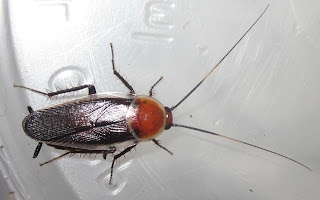
Pycnoscelus surinamensis "Dark" (Dark Surinam Roaches)
A dark strain of Surinam roaches that were accidentally being traded as P.nigra (Shadow Roaches). The adults in this culture range from dark brown to black. Care is the same as other surinamensis. *FL Legal*
10 Mixed: $12
20 Mixed: $20
Salganea incerta (Dwarf Wood Roach)
New to the US hobby, very rarely offered here. This is one of the fastest growing, yet slowest breeding Panesthiinae in the US hobby, they normally only have half a dozen nymphs per litter. They need a substrate of rotten wood, and really seem to prefer white rot. Definitely a must-have species for the experienced roach enthusiast.
(Caresheet)
8 Mixed nymphs: $140 (One Group Available)
Symploce morsei "Key Largo, FL" (Morse's Symploce)
A pretty species that does well when kept humid, and loves hiding in leaf litter. Nymphs go through a significant color pattern change through their life cycle, which is fun to watch. *FL Legal*
(Caresheet)
10 Small nymphs: $30
Beetles:
Alphitobius diaperinus (Lesser Mealworm)
A small, prolific darkling beetle, commonly used as feeders and/or cleaner crews for feeder roaches.
10 Mixed: $5
Apsena sp. "Kuna" (Micro Goblin Darklings)
A small but prolific species, with a dark red and blue color palate. This species breeds well but requires a very mild diapause (mid 60s) for yearly production. Good species to cohabitate with larger Teneb species in mixed tanks.
(Caresheet)
8 Mixed larvae: $15
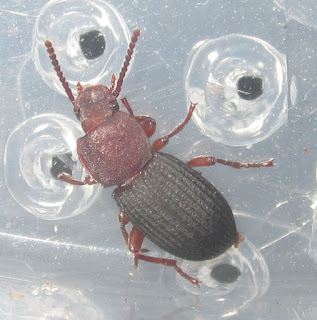
Blapstinus sp. "Bylas, AZ" (Grey Sidewalk Darkling)
A small, slightly hairy species of darkling beetle. Easy to rear and prolific, but breeds in spurts.
(Caresheet)
8 Mixed: $15
Blapstinus sp. "Kuna, ID" (Grey Sidewalk Darkling)
A small, slightly hairy species of darkling beetle. Easy to rear, breeds well in larger roach enclosures (like hissers).
(Caresheet)
8 Mixed: $15
Conibius seriatus (Red & Blue Micro-Darkling)
Cute, easy to rear species of desert darkling, very fast growing, potential use as a feeder. Cultures need a winter dormant period in the mid 60s for good yearly reproduction.
(Caresheet)
8 Mixed: $15
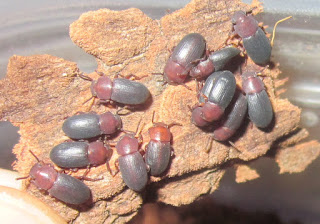
Deilelater physoderus "George West, TX" (Texas Bioluminescent Click Beetle)
A small US native click beetle, much like it's larger relatives in terms of care. Adults feed on fruits, and larvae feed on rotten wood for the first few instars, switching to a predatory diet afterwards.
(Caresheet)
6 Tiny larvae: $60
12 Tiny larvae: $100
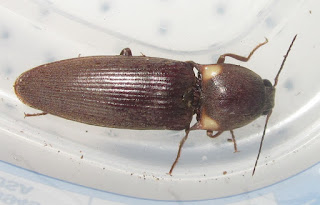
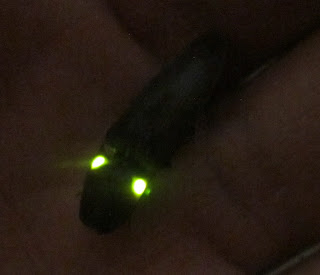
Eleodes hispilabris "Pacific Northwest Race" (Common Darkling Beetle)
This species is easy to rear and is great for beginners, in fact these were the first desert darkling beetles I ever bred! Adults of this race have pretty deep groves in the elytra and a matte exoskeleton texture.
(Caresheet)
10 Mixed larvae: $15
Eleodes hispilabris "South TX Race" (Common Darkling Beetle)
This is a very widespread and easy to breed desert darkling beetle species, with many "races" across it's range. This race is known for the pitted lines going down the elytra rather than straight grooves, and a more glossy elytra texture. Some adults of this specific locality have a red stripe going down their elytra.
(Caresheet)
10 Small larvae: $15
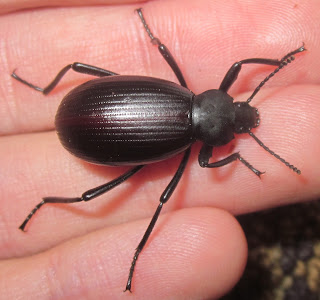
Eleodes spinipes macrura (Giant Texas Darkling Beetle)
One of the largest US darkling beetles, truly a hefty species, and easy to rear to boot! Females are quite rotund, whereas males are a bit skinnier and have extensions at the tips of their elytra called "mucros".
(Caresheet)
10 Mixed larvae: $25
Embaphion glabrum "Colorado City, AZ" (Smooth Pie-dish Beetle)
A brand new species to culture! Adults are similar to E.contusum in morphology, but have very smooth exoskeletons, and more exaggerated pronotum structure.
(Caresheet)
8 Mixed larvae: $30 (Ask for Availability)
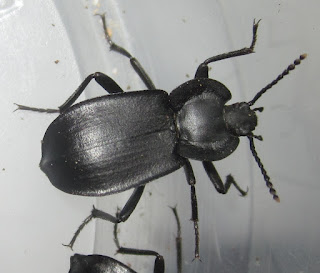
Embaphion muricatum "Chaves County, NM" (Pie-dish Beetle)
A new, entomophagous fungus free line of the OG Pie-dish darkling beetle. A hardy, easy to breed species, adults have some of the most unique and exaggerated morphology of any cultured darkling.
(Caresheet)
8 Mixed larvae: $30 (Ask for Availability)
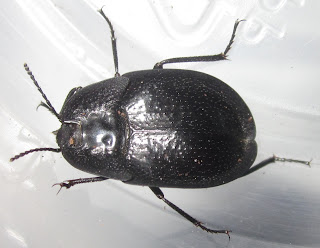
Lasioderma serricorne (Cigarette Beetle)
Common pests of stored plant and animal based products, these are easy to culture in just about anything, dog food, oats, etc, don't seem to need moisture either. Could be used as tiny feeders.
12 Mixed: $5
Neatus tenebrioides "Livonia, MI" (Neat Mealworms)
A nice new addition to culture, this species is closely related to Tenebrio and can be reared in a similar fashion. Prolific and can be used as feeders.
10 Mixed larvae: $20
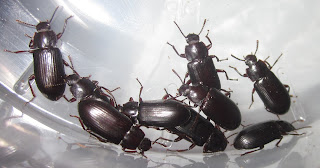
Tenebrio obscurus (Dark Mealworm)
Breeds at a comparable rate to T.molitor, but the larvae are typically dark brown rather than yellow.
10 Mixed larvae: $5
Triorophus sp. "Fort Stockton, TX" (Huckleberry Darklings)
A small but hardy species of darkling beetle that's easy to breed. When untouched and kept dry, adults develop a thick powdery blue coating on their exoskeletons, that makes them look like little huckleberries IMO. Brand new to culture, and hopefully a new hobby staple!
(Caresheet)
8 Mixed larvae: $30
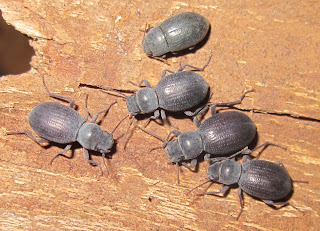
Zophobas atratus "Sugarloaf Key, FL" (Superworm Beetle)
This wild type strain of Z.atratus differs markedly from the pet hobby stock in that the elytral striations are much deeper and larger. A completely different bloodline than the common hobby stock.
10 Mixed larvae: $15 (Limited Numbers Available)
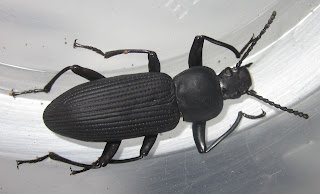
Flies:
Setomima nitida (Black Fairy Moth Fly)
These little cuties are brand new to the hobby, probably the first time they've ever been publicly sold!
 Easy to culture, prolific, and has some oddball feeder potential, for small predators that like flying prey.
Easy to culture, prolific, and has some oddball feeder potential, for small predators that like flying prey.
(Caresheet)
10+ Mixed larvae: $20
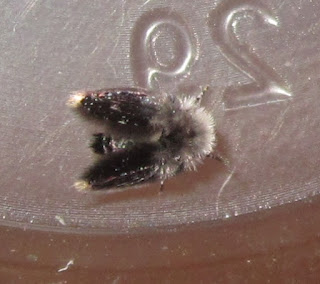
Isopods:
Armadillidium corcyraeum (Greek Spotted Roly-poly)
A beautiful species similar in appearance and care to A.maculatum. These can be a bit slow to establish at first, but are quite prolific when they do breed, (like most members of this genus). The amount of white patterning varies greatly from individual to individual.
10 Mixed: $20
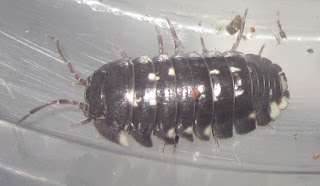
Armadillidium gestroi (Gestro’s Roly-poly)
A giant among Armadillidium, and beautiful to boot! These are easy to breed and handle a variety of humidity levels but seem to prefer fairly humid conditions, and high ventilation levels.
10 Mixed: $20
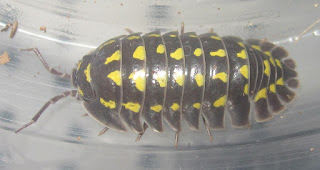
Armadillidium klugii (Clown Roly-poly)
This is a "hobby line" that appears to be a mix of the "Montenegro" and "Dubrovnik" localities, such mixes are common and are unfortunately often mislabeled as being pure locales of one or the other. Prefers a good humidity gradient, and high ventilation.
10 Mixed: $12
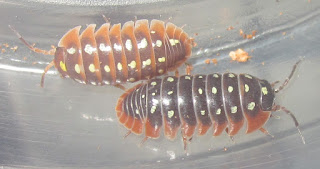
Armadillidium werneri (Clown Roly-poly)
This line appears to be a mix of normal and "Ghost Phase" individuals, honestly erring more towards "Ghost Phase" ones. Prefers a good humidity gradient, and high ventilation.
10 Mixed: $20
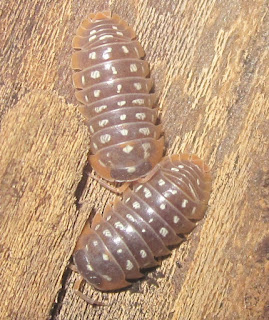
Cubaris sp. "Panda King" (Panda King Isopod)
A very prolific and easy to breed Cubaris that tolerates a wide level of ventilation and temperature ranges.
8 Mixed: $25
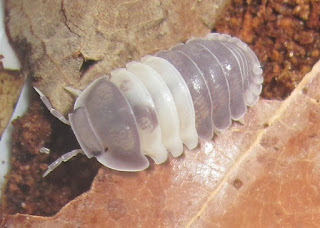
Cubaris sp. "Rubber Ducky - Blondish" (Rubber Ducky Isopod)
The isopod that started the great "Cubaris Craze", the Rubber Ducky isopod. This particular strain throws out completely orange individuals, darker, more normal individuals, and intergrade between the two. Easy to keep, if a bit slow breeding.
8 Mixed: $65
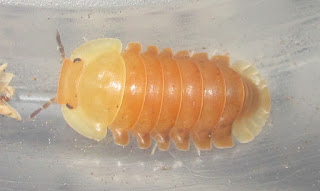
Cylisticus convexus "Eagle, ID" (Curly Isopod)
A common backyard species, hardy and easy to breed. Individuals of this species can curl up when disturbed, but not into a perfect sphere, but rather a teardrop shape.
10 Mixed: $8
Helleria brevicornis "Provence-Alpes-Côte d'Azur, France" (Giant Roly-Poly)
The largest terrestrial conglobating (curling) isopod, needs a deep organically rich substrate. Slow growing and breeding, but gives birth to large litters once a year. A mild winter cool period (60-65F°) is needed for yearly reproduction.
8 Small individuals: $150
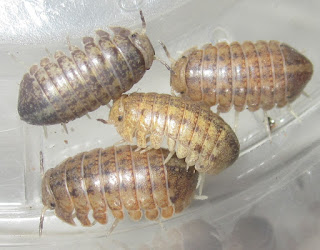
Nesodillo arcangelii "Shiro Utsuri" (Shiro Utsuri Isopod)
This beautiful strain of N.arcangelii appears to represent the "Dalmatian" type mutation for this species, supposedly isolated from the "Silver Ghost" strain. The name "Shiro Utsuri" is a reference to a black and white Koi fish morph. Keep this species humid and moderately to highly ventilated, and they'll thrive.
8 Mixed: $30
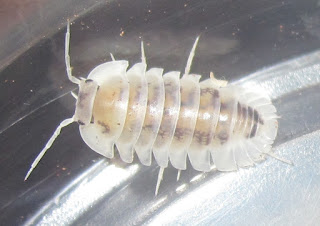
Porcellio nicklesi (Salmon Sowbug)
A neat species, formerly considered a synonym of P.bolivari. Easier than true bolivari, and a good gateway species into the Spanish Porcellio.
8 Mixed: $30
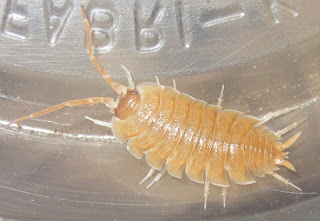
Porcellio scaber "Lottery Ticket" (Rough Isopod)
A mix of various recognized morphs, with this strain mainly producing calicos, normals and the odd white-out. Large colonies are quite pleasant to look at, and perfect for getting a head start on isolating specific morphs!
10 Mixed: $12
Porcellionides sp. "Big Pine Key, FL" (BPK Beauties)
A beautiful, likely undescribed species within the virgatus complex, slow breeding/growing, preferring conditions similar to Spanish Porcellio. Super variable in coloration, some of the prettiest isopods I've ever seen!
8 Small individuals: $165
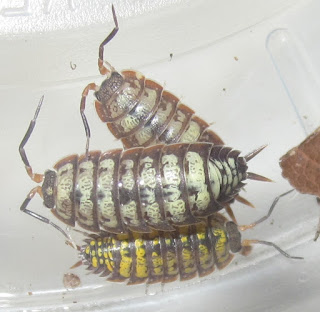
Trachelipus rathkii "Ada County, ID" (Swamp Isopod)
This locale throws out both grey and orange/calico looking individuals. An easy to breed and prolific isopod species, needs consistently high humidity.
10 Mixed: $10
Trichorhina tomentosa (Dwarf White Isopod)
Perhaps the most common and well known isopod in culture. Can make decent feeders for tiny predators, and are often used as cleaner crews or additives to bioactive setups (though personally I'm opposed to their use for either of those). Parthenogenetic, and breeds best when humidity is high.
12+ Mixed: $5
Harvestmen:
Vonones ornata "Ocala, FL" (Ornate Harvestman)
These are fairly easy to breed so long as they're given adequate space and surface area, along with plenty of small live prey in the form of springtails/fruit flies. Will also nibble on fruits and dog food.
8 Mixed CB individuals: $55
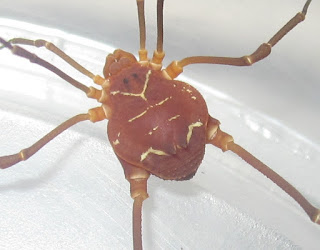
Springtails & Mites:
*Springtail culture purity guaranteed to be at least 75% or more of the selected species. Some cross contamination is expected based on the propensity for springtails to jump cultures and coexist with other species.*
Coecobrya sp. "Tropical Pink" (Tropical Pink Springtails)
ex. Sinella curviseta. Very prolific species that can handle a wide range of conditions, but does best in consistently humid setups.
20+ Mixed: $5
50+ Mixed: $10
Cyphoderus sp. "Bylas, AZ" (Bylas Ant Springtails)
Small, silvery white springtails that breed prolifically in humid conditions.
10+ Mixed: $15
Entomobrya unostrigata (Cotton Springtails)
Super prolific springtail that does best in arid, well ventilated setups. Not commonly offered. *Dry Hardy*
20+ Mixed: $5 (Ask for Availability)
50+ Mixed: $10 (Ask for Availability)
cf. Willowsia sp. "Kota Kinabalu" (Malaysian Silver Scaly Springtails)
An unidentified species from Kota Kinabalu, Malaysia, new to US culture! Tolerates a variety of humidity levels, and is rather prolific. *Dry Hardy*
20+ Mixed: $5
50+ Mixed: $10
Oribatida sp. "Red" (Red Oribatid Mite)
These mites are good for really only one thing... outcompeting grain mites. They have the same ecological niche, however unlike grain mites they rarely attach to insects in a hypopus stage (I have seen them do it, but very rarely). They're a lesser evil if you will, an O.K alternative to grain mites if you have a lot of grain mite issues.
20+ Mixed: $5
Stratiolaelaps scimitus *ex Hypoaspis miles* (Predatory Mite)
Great fungus gnat control, and they also feed on grain mites, certain springtails, and nematodes.
15+ Mixed: $8 (Ask for Availability)
Desert Predatory Mites (Acari sp. "Idaho")
An unknown species of predatory mite that I think I picked up accidentally on leaf litter or something here in Idaho... They seem very well adapted to drier climates and thrive in my darkling beetle enclosures, where they mostly seem to feed on grain mites and sometimes springtails as well. Similar to the above S.scimitus, but faster, glossier and not hairy at all.
15+ Mixed: $8 (Ask for Availability)
Terms & Conditions:
Minimum order $25 not including shipping. Will not ship roaches to FL other than the few species marked "*FL Legal*". We accept Paypal and Cashapp only. I almost always ship domestically via USPS Priority Mail, shipping via normal priority usually costs $15 to $18 depending on the order size. Priority Express costs $50-$60, and is not guaranteed to arrive overnight due to the rural area I live in (two days is more typical), so it's often redundant unless normal priority is experiencing delays. Heat packs, if needed, will cost an extra $5 per pack.
I ship out on Mondays/Tuesdays for all payments and mailing addresses received by Sunday evening. (So if you place an order on Monday, it most likely will not be shipped out until Tuesday of the FOLLOWING week).
Due to negative experiences with USPS wildly mishandling packages that are held for pickup, we suggest against asking for packages to be marked HOLD FOR PICKUP, unless you know your post offices handles these types of packages with little issue. Otherwise, if your temps are too extreme, or you won't be able to accept delivery at home, or if you have some other reason for not being able to have the invertebrates shipped to your door, then I strongly advise you don't order.
I am not responsible for any deaths due to mishandling, acts of God and extreme temperatures. If your local temperatures are in the 90's or above or the 40's and below, (and you do not include a heat pack in your order for the latter), order at your own risk! Isopods/Camel crickets in particular are VERY sensitive to high temperatures, ordering them when your local temps are in the 80s or above may be a death sentence. ****roaches and some beetles are more flexible when it comes to hot conditions, so if the temperatures in your area are in the 90s or above, we can discus a LAG agreement for certain, heat hardy species.
If, for some reason the invertebrates arrive dead, and they were shipped during weather I suggested should be fine, please send a photo of the dead invertebrates in question within 24 HOURS of arrival, and we can work on a replacement shipment or partial refund. If no proof in the form of a photo or a video is supplied, I will not take any responsibility for DOAs.
PM me to order, or if you have any questions at: [email protected].
Roaches:
Aglaopteryx gemma "Key Largo, FL" (Little Gem Roach)
This small but beautiful Ectobiid hails from the southeastern US, and has eluded culture for quite some time. Thankfully they've actually proven rather easy to breed, and enjoy humid and warm conditions, with good airflow. All life stages climb well, but thankfully adults of neither sex can fly. *FL Legal*
(Caresheet)
10 Mixed nymphs: $20
20 Mixed nymphs: $30
Arenivaga bolliana "Del Rio, TX" (Dark Form) (Boll's Dark Sand Roach)
A rare color form of an already rarely cultured species, adult males of this form sport dark grey/black wings with slight tan speckling, and females are black with reddish abdomens. One of the easier to culture Arenivaga IMO.
(Caresheet)
10 Mixed nymphs: $25
Arenivaga tonkawa "San Antonio, TX" (Tonkawa Sand Roach)
A nice little native sand roach, one of the easiest to culture. They seem to prefer higher humidity than some other Arenivaga spp., but similar to the rest of the genus, need very high ventilation levels.
(Caresheet)
8 Small nymphs: $20
Balta vilis (Plain Yellow Roach)
A small delicate species that is a plain but attractive yellow color. Fairly easy to set up and prolific if kept right, a must have for Ectobiid enthusiasts. First US offering in years!
(Caresheet)
10 Mixed: $25
25 Mixed: $30
50 Mixed: $45
Compsodes schwarzi (Schwarz's Hooded Roach)
Second smallest roach in the hobby, prolific and a great micro-feeder! *FL Legal*
(Caresheet)
25 Mixed: $20
50 Mixed: $35
100 Mixed: $60
200 Mixed: $100
Dipteretrum hanstroemi (Hanström's Little Runners)
A very underrated African Ectobiid that breeds rather prolifically in warm, dry, well ventilated conditions. They can be prone to bent/shortened antennae issues if humidity is too high. They have some feeder potential, though all life stages climb well.
(Caresheet)
10 Small nymphs: $20
Epilamprinae sp. "Kota Kinabalu, Malaysia" (Borneo Leaf Mimic)
An unidentified (and likely undescribed) species from Malaysia, one of the hardiest and easiest to breed Epilamprids in the hobby. Beautiful, with females usually being an olive brown color, males often a brighter orange.
10 Mixed nymphs: $25
20 Mixed nymphs: $35
Euthlastoblatta diaphana (Transparent Belle Roach) This small species is new to US culture, but has been in the hobby overseas for quite some time. They do well kept humid but well ventilated, and are rather prolific. Their large nymphs are among the prettiest Ectobiids I've kept. (Caresheet) 10 Small nymphs: $25 Gromphadorhina portentosa "LLE Mahogany" (Mahogany Hissing ****roach) *Pure* This wonderful strain of PURE portentosa was isolated from the old "1972 Cleveland Aquarium" stock, and was selected for unusually pale and rich mahogany looking individuals. |
10 Mixed nymphs: $30
20 Mixed nymphs: $50
30 Mixed nymphs: $65
Gromphadorhina sp. "Unidentified" (Sidestripe Hissing ****roach) *Pure*
Most likely a pure, distinct locality/subspecies of G.portentosa. An impressive strain both in coloration and size, sadly the locality is unknown. Very uncommon in the hobby, rarely available!
8 Mixed: $70
5 Small/Medium adult males: $30
Gyna capucina (Pink Roach)
One of the holy grails of US Blatticulture, the Pink roach! These beauties are a bit more demanding than other Gyna spp., and need decent space and a steady source of high heat for consistent breeding.
(Caresheet)
10 Small nymphs: $70
Margattea nimbata (Raindrop Roach)
A neat, small Ectobiid brand spanking new to US culture. Easy to breed and tolerant of a wide variety of conditions.
(Caresheet)
10 Mixed: $20
20 Mixed: $30
Neostylopyga rhombifolia "Chinese Hobby Stock" (Harlequin Roach)
A very pretty species that seems to regularly crash and boom in the US hobby. Many strains are finicky and have issues with ooths failing to hatch, random nymph die offs, etc., this strain doesn't appear to have that issue though. Males of this stock have pretty red coloration on their abdomens, females are more black.
10 Small nymphs: $65 (Ask for Availability)
Panesthia angustipennis cognata "Cambodia" (Orangeback Roach)
New and very rarely available in the US hobby, this is a slow growing and breeding species that needs a substrate of rotten wood. Medium/Large nymphs are beautifully patterned, and the chunky little adults are adorable as well!
8 Small nymphs: $70
Parcoblatta americana "Table Rock, Boise - ID" (American Wood Roach)
US native, can take a while to get cultures established, but makes for a good occasional feeder that breeds at room temps, and won't infest your house!
(Caresheet)
10 Mixed nymphs: $20
20 Mixed nymphs: $30
Perisphaerus punctatus "Macao" (Punctate Roly-poly Roach)
A brand new species to culture, first US offering! This species is very similar to P.pygmaeus, but is larger, glossier, more arboreal, hardier, and can handle slightly drier setups as well (though high air humidity is important). At last, an alternative to P.pygmaeus in the hobby!
8 Small nymphs: $130
| Plectoptera poeyi (Florida Beetle Roach) |
A small beetle mimic, this species is very difficult to find in the wild, and even more rare in culture. They are fairly finicky, and prefer high humidity, decent ventilation and multiple feeding areas. *FL Legal*
(Caresheet)
8 Mixed nymphs: $30
Princisia vanwaerebeki "Big/Black" (Vibrant Hisser) *Pure*
The most basic form of this species in cultivation, with most adults sporting black base coloration, with orange/yellowish abdominal margins. This particular stock throws out a decent number of completely black adults, which is unusual for pure stock of this species, but all males of this stock have the characteristic notch on the anterior margins of their pronotums, while hybrid lines normally have variable pronotum shapes.
(Caresheet)
8 Mixed nymphs: $60
5 Small/Medium adult males: $30
Pseudoglomeris aerea "Yunnan" (Mirror Spot Roach)
These beauties hail from temperate China, and have a dark metallic green sheen, covered in silvery-green hairs. The reflective, silvery spots on their sides are the inspiration for the common name "Mirror Spots". Requires a mild winter diapause. Very rare in culture.
8 Small nymphs: $250 (One Group Available)
Pseudomops septentrionalis "San Antonio, TX" (Pale-bordered field roach)
Parent stock collected in 2016. A beautiful US native that has brightly colored adults, and is prolific to boot!
(Caresheet)
12 Small nymphs: $25
24 Small nymphs: $40
Pycnoscelus surinamensis "Dark" (Dark Surinam Roaches)
A dark strain of Surinam roaches that were accidentally being traded as P.nigra (Shadow Roaches). The adults in this culture range from dark brown to black. Care is the same as other surinamensis. *FL Legal*
10 Mixed: $12
20 Mixed: $20
Salganea incerta (Dwarf Wood Roach)
New to the US hobby, very rarely offered here. This is one of the fastest growing, yet slowest breeding Panesthiinae in the US hobby, they normally only have half a dozen nymphs per litter. They need a substrate of rotten wood, and really seem to prefer white rot. Definitely a must-have species for the experienced roach enthusiast.
(Caresheet)
8 Mixed nymphs: $140 (One Group Available)
Symploce morsei "Key Largo, FL" (Morse's Symploce)
A pretty species that does well when kept humid, and loves hiding in leaf litter. Nymphs go through a significant color pattern change through their life cycle, which is fun to watch. *FL Legal*
(Caresheet)
10 Small nymphs: $30
Beetles:
Alphitobius diaperinus (Lesser Mealworm)
A small, prolific darkling beetle, commonly used as feeders and/or cleaner crews for feeder roaches.
10 Mixed: $5
Apsena sp. "Kuna" (Micro Goblin Darklings)
A small but prolific species, with a dark red and blue color palate. This species breeds well but requires a very mild diapause (mid 60s) for yearly production. Good species to cohabitate with larger Teneb species in mixed tanks.
(Caresheet)
8 Mixed larvae: $15
Blapstinus sp. "Bylas, AZ" (Grey Sidewalk Darkling)
A small, slightly hairy species of darkling beetle. Easy to rear and prolific, but breeds in spurts.
(Caresheet)
8 Mixed: $15
Blapstinus sp. "Kuna, ID" (Grey Sidewalk Darkling)
A small, slightly hairy species of darkling beetle. Easy to rear, breeds well in larger roach enclosures (like hissers).
(Caresheet)
8 Mixed: $15
Conibius seriatus (Red & Blue Micro-Darkling)
Cute, easy to rear species of desert darkling, very fast growing, potential use as a feeder. Cultures need a winter dormant period in the mid 60s for good yearly reproduction.
(Caresheet)
8 Mixed: $15
Deilelater physoderus "George West, TX" (Texas Bioluminescent Click Beetle)
A small US native click beetle, much like it's larger relatives in terms of care. Adults feed on fruits, and larvae feed on rotten wood for the first few instars, switching to a predatory diet afterwards.
(Caresheet)
6 Tiny larvae: $60
12 Tiny larvae: $100
Eleodes hispilabris "Pacific Northwest Race" (Common Darkling Beetle)
This species is easy to rear and is great for beginners, in fact these were the first desert darkling beetles I ever bred! Adults of this race have pretty deep groves in the elytra and a matte exoskeleton texture.
(Caresheet)
10 Mixed larvae: $15
Eleodes hispilabris "South TX Race" (Common Darkling Beetle)
This is a very widespread and easy to breed desert darkling beetle species, with many "races" across it's range. This race is known for the pitted lines going down the elytra rather than straight grooves, and a more glossy elytra texture. Some adults of this specific locality have a red stripe going down their elytra.
(Caresheet)
10 Small larvae: $15
Eleodes spinipes macrura (Giant Texas Darkling Beetle)
One of the largest US darkling beetles, truly a hefty species, and easy to rear to boot! Females are quite rotund, whereas males are a bit skinnier and have extensions at the tips of their elytra called "mucros".
(Caresheet)
10 Mixed larvae: $25
Embaphion glabrum "Colorado City, AZ" (Smooth Pie-dish Beetle)
A brand new species to culture! Adults are similar to E.contusum in morphology, but have very smooth exoskeletons, and more exaggerated pronotum structure.
(Caresheet)
8 Mixed larvae: $30 (Ask for Availability)
Embaphion muricatum "Chaves County, NM" (Pie-dish Beetle)
A new, entomophagous fungus free line of the OG Pie-dish darkling beetle. A hardy, easy to breed species, adults have some of the most unique and exaggerated morphology of any cultured darkling.
(Caresheet)
8 Mixed larvae: $30 (Ask for Availability)
Lasioderma serricorne (Cigarette Beetle)
Common pests of stored plant and animal based products, these are easy to culture in just about anything, dog food, oats, etc, don't seem to need moisture either. Could be used as tiny feeders.
12 Mixed: $5
Neatus tenebrioides "Livonia, MI" (Neat Mealworms)
A nice new addition to culture, this species is closely related to Tenebrio and can be reared in a similar fashion. Prolific and can be used as feeders.
10 Mixed larvae: $20
Tenebrio obscurus (Dark Mealworm)
Breeds at a comparable rate to T.molitor, but the larvae are typically dark brown rather than yellow.
10 Mixed larvae: $5
Triorophus sp. "Fort Stockton, TX" (Huckleberry Darklings)
A small but hardy species of darkling beetle that's easy to breed. When untouched and kept dry, adults develop a thick powdery blue coating on their exoskeletons, that makes them look like little huckleberries IMO. Brand new to culture, and hopefully a new hobby staple!
(Caresheet)
8 Mixed larvae: $30
Zophobas atratus "Sugarloaf Key, FL" (Superworm Beetle)
This wild type strain of Z.atratus differs markedly from the pet hobby stock in that the elytral striations are much deeper and larger. A completely different bloodline than the common hobby stock.
10 Mixed larvae: $15 (Limited Numbers Available)
Flies:
Setomima nitida (Black Fairy Moth Fly)
These little cuties are brand new to the hobby, probably the first time they've ever been publicly sold!
(Caresheet)
10+ Mixed larvae: $20
Isopods:
Armadillidium corcyraeum (Greek Spotted Roly-poly)
A beautiful species similar in appearance and care to A.maculatum. These can be a bit slow to establish at first, but are quite prolific when they do breed, (like most members of this genus). The amount of white patterning varies greatly from individual to individual.
10 Mixed: $20
Armadillidium gestroi (Gestro’s Roly-poly)
A giant among Armadillidium, and beautiful to boot! These are easy to breed and handle a variety of humidity levels but seem to prefer fairly humid conditions, and high ventilation levels.
10 Mixed: $20
Armadillidium klugii (Clown Roly-poly)
This is a "hobby line" that appears to be a mix of the "Montenegro" and "Dubrovnik" localities, such mixes are common and are unfortunately often mislabeled as being pure locales of one or the other. Prefers a good humidity gradient, and high ventilation.
10 Mixed: $12
Armadillidium werneri (Clown Roly-poly)
This line appears to be a mix of normal and "Ghost Phase" individuals, honestly erring more towards "Ghost Phase" ones. Prefers a good humidity gradient, and high ventilation.
10 Mixed: $20
Cubaris sp. "Panda King" (Panda King Isopod)
A very prolific and easy to breed Cubaris that tolerates a wide level of ventilation and temperature ranges.
8 Mixed: $25
Cubaris sp. "Rubber Ducky - Blondish" (Rubber Ducky Isopod)
The isopod that started the great "Cubaris Craze", the Rubber Ducky isopod. This particular strain throws out completely orange individuals, darker, more normal individuals, and intergrade between the two. Easy to keep, if a bit slow breeding.
8 Mixed: $65
Cylisticus convexus "Eagle, ID" (Curly Isopod)
A common backyard species, hardy and easy to breed. Individuals of this species can curl up when disturbed, but not into a perfect sphere, but rather a teardrop shape.
10 Mixed: $8
Helleria brevicornis "Provence-Alpes-Côte d'Azur, France" (Giant Roly-Poly)
The largest terrestrial conglobating (curling) isopod, needs a deep organically rich substrate. Slow growing and breeding, but gives birth to large litters once a year. A mild winter cool period (60-65F°) is needed for yearly reproduction.
8 Small individuals: $150
Nesodillo arcangelii "Shiro Utsuri" (Shiro Utsuri Isopod)
This beautiful strain of N.arcangelii appears to represent the "Dalmatian" type mutation for this species, supposedly isolated from the "Silver Ghost" strain. The name "Shiro Utsuri" is a reference to a black and white Koi fish morph. Keep this species humid and moderately to highly ventilated, and they'll thrive.
8 Mixed: $30
Porcellio nicklesi (Salmon Sowbug)
A neat species, formerly considered a synonym of P.bolivari. Easier than true bolivari, and a good gateway species into the Spanish Porcellio.
8 Mixed: $30
Porcellio scaber "Lottery Ticket" (Rough Isopod)
A mix of various recognized morphs, with this strain mainly producing calicos, normals and the odd white-out. Large colonies are quite pleasant to look at, and perfect for getting a head start on isolating specific morphs!
10 Mixed: $12
Porcellionides sp. "Big Pine Key, FL" (BPK Beauties)
A beautiful, likely undescribed species within the virgatus complex, slow breeding/growing, preferring conditions similar to Spanish Porcellio. Super variable in coloration, some of the prettiest isopods I've ever seen!
8 Small individuals: $165

Trachelipus rathkii "Ada County, ID" (Swamp Isopod)
This locale throws out both grey and orange/calico looking individuals. An easy to breed and prolific isopod species, needs consistently high humidity.
10 Mixed: $10
Trichorhina tomentosa (Dwarf White Isopod)
Perhaps the most common and well known isopod in culture. Can make decent feeders for tiny predators, and are often used as cleaner crews or additives to bioactive setups (though personally I'm opposed to their use for either of those). Parthenogenetic, and breeds best when humidity is high.
12+ Mixed: $5
Harvestmen:
Vonones ornata "Ocala, FL" (Ornate Harvestman)
These are fairly easy to breed so long as they're given adequate space and surface area, along with plenty of small live prey in the form of springtails/fruit flies. Will also nibble on fruits and dog food.
8 Mixed CB individuals: $55
Springtails & Mites:
*Springtail culture purity guaranteed to be at least 75% or more of the selected species. Some cross contamination is expected based on the propensity for springtails to jump cultures and coexist with other species.*
Coecobrya sp. "Tropical Pink" (Tropical Pink Springtails)
ex. Sinella curviseta. Very prolific species that can handle a wide range of conditions, but does best in consistently humid setups.
20+ Mixed: $5
50+ Mixed: $10
Cyphoderus sp. "Bylas, AZ" (Bylas Ant Springtails)
Small, silvery white springtails that breed prolifically in humid conditions.
10+ Mixed: $15
Entomobrya unostrigata (Cotton Springtails)
Super prolific springtail that does best in arid, well ventilated setups. Not commonly offered. *Dry Hardy*
20+ Mixed: $5 (Ask for Availability)
50+ Mixed: $10 (Ask for Availability)
cf. Willowsia sp. "Kota Kinabalu" (Malaysian Silver Scaly Springtails)
An unidentified species from Kota Kinabalu, Malaysia, new to US culture! Tolerates a variety of humidity levels, and is rather prolific. *Dry Hardy*
20+ Mixed: $5
50+ Mixed: $10
Oribatida sp. "Red" (Red Oribatid Mite)
These mites are good for really only one thing... outcompeting grain mites. They have the same ecological niche, however unlike grain mites they rarely attach to insects in a hypopus stage (I have seen them do it, but very rarely). They're a lesser evil if you will, an O.K alternative to grain mites if you have a lot of grain mite issues.
20+ Mixed: $5
Stratiolaelaps scimitus *ex Hypoaspis miles* (Predatory Mite)
Great fungus gnat control, and they also feed on grain mites, certain springtails, and nematodes.
15+ Mixed: $8 (Ask for Availability)
Desert Predatory Mites (Acari sp. "Idaho")
An unknown species of predatory mite that I think I picked up accidentally on leaf litter or something here in Idaho... They seem very well adapted to drier climates and thrive in my darkling beetle enclosures, where they mostly seem to feed on grain mites and sometimes springtails as well. Similar to the above S.scimitus, but faster, glossier and not hairy at all.
15+ Mixed: $8 (Ask for Availability)
Terms & Conditions:
Minimum order $25 not including shipping. Will not ship roaches to FL other than the few species marked "*FL Legal*". We accept Paypal and Cashapp only. I almost always ship domestically via USPS Priority Mail, shipping via normal priority usually costs $15 to $18 depending on the order size. Priority Express costs $50-$60, and is not guaranteed to arrive overnight due to the rural area I live in (two days is more typical), so it's often redundant unless normal priority is experiencing delays. Heat packs, if needed, will cost an extra $5 per pack.
I ship out on Mondays/Tuesdays for all payments and mailing addresses received by Sunday evening. (So if you place an order on Monday, it most likely will not be shipped out until Tuesday of the FOLLOWING week).
Due to negative experiences with USPS wildly mishandling packages that are held for pickup, we suggest against asking for packages to be marked HOLD FOR PICKUP, unless you know your post offices handles these types of packages with little issue. Otherwise, if your temps are too extreme, or you won't be able to accept delivery at home, or if you have some other reason for not being able to have the invertebrates shipped to your door, then I strongly advise you don't order.
I am not responsible for any deaths due to mishandling, acts of God and extreme temperatures. If your local temperatures are in the 90's or above or the 40's and below, (and you do not include a heat pack in your order for the latter), order at your own risk! Isopods/Camel crickets in particular are VERY sensitive to high temperatures, ordering them when your local temps are in the 80s or above may be a death sentence. ****roaches and some beetles are more flexible when it comes to hot conditions, so if the temperatures in your area are in the 90s or above, we can discus a LAG agreement for certain, heat hardy species.
If, for some reason the invertebrates arrive dead, and they were shipped during weather I suggested should be fine, please send a photo of the dead invertebrates in question within 24 HOURS of arrival, and we can work on a replacement shipment or partial refund. If no proof in the form of a photo or a video is supplied, I will not take any responsibility for DOAs.
PM me to order, or if you have any questions at: [email protected].
Last edited by a moderator: